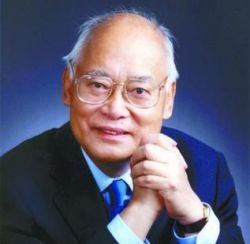He Zhenliang
He Zhenliang (Chinese: 何振梁) (1929-2015) was one of the most highly regarded dignitaries in China. With the nickname “China’s Mr. Olympics,” he was quite possibly the most influential Chinese Olympic personality of his time. He had been a key figure in the Chinese sports arena since the founding of the People's Republic of China and the establishment of the modern Chinese sports administration system.
He was born on December 29, 1929 in Zhejiang Province. He graduated from the Aurore University in Shanghai. In 1964, he became the deputy secretary general of the Chinese Gymnastics Association. He later served as the secretary general of the Chinese Table Tennis Association and the head of the secretariat of the All-China Sports Federation. In 1979, he was promoted to the deputy secretary general of the All-China Sports Federation and the Chinese Olympic Committee (COC). He served as the secretary general of COC between 1982 and 1986, vice president between 1986 and 1989, and president of COC between 1989 and 1994.
He was elected to the International Olympic Committee (IOC) in 1981. In 1985, he was elected to the executive board of IOC, serving three 5-year terms after that. He was elected Vice President of the IOC in 1989.
He died of illness on Jan. 4, 2015 in Beijing at the age of 85.
China's Mr. Olympics
“I am proud of my country. I am proud of my people.” These are the words of He Zhenliang, China’s representative to the International Olympics Committee, upon hearing Beijing had won the bid for the 2008 Olympics. A true patriot representing China and the Chinese people, He and the result of his work will affect China’s development and growth in the 21st century.
He is honorary president of the Chinese Olympic Committee and a member of the International Olympic Committee. He has devoted virtually his whole life to the Olympic movement and the principles it stands for. For him personally, the holding of the Games in Beijing was more than a cause, it was a passion made all the more intense after his disappointment in 1993, when the city lost its first bid for the 2000 Olympic Games by just two votes.
Far from giving up, the frustration of the first failure encouraged him to help Beijing in its second bid for the Games.
As a Chinese IOC member, he acted as a bridge connecting Chinese sports with the rest of the world. He introduced the bid plan and the progress Beijing had made to his IOC colleagues. Upon hearing their reactions, criticisms and suggestions, he relayed them back to people in China and reported back to the IOC on the measures that would be taken.
Continued efforts were finally rewarded with good results. When Beijing won the bid, He was so excited that he was moved to tears. He started his career in the Olympic cause in the 1950s, working in the field for half a century.
He says he loves his job and loves the Olympic cause.
"It's really very challenging but also very exciting. Challenging because we have to face all kinds of problems-- sports, economic and political; but also it's exciting because when you see your efforts have achieved good results, you really feel happy. For me, what's important is that I have done my utmost for my country."
Distinctions
Lifetime Achievement Award, the most prestigious sports award in China
Selected by Western media as one of the “top 10 most influential sporting leaders in the world”.
